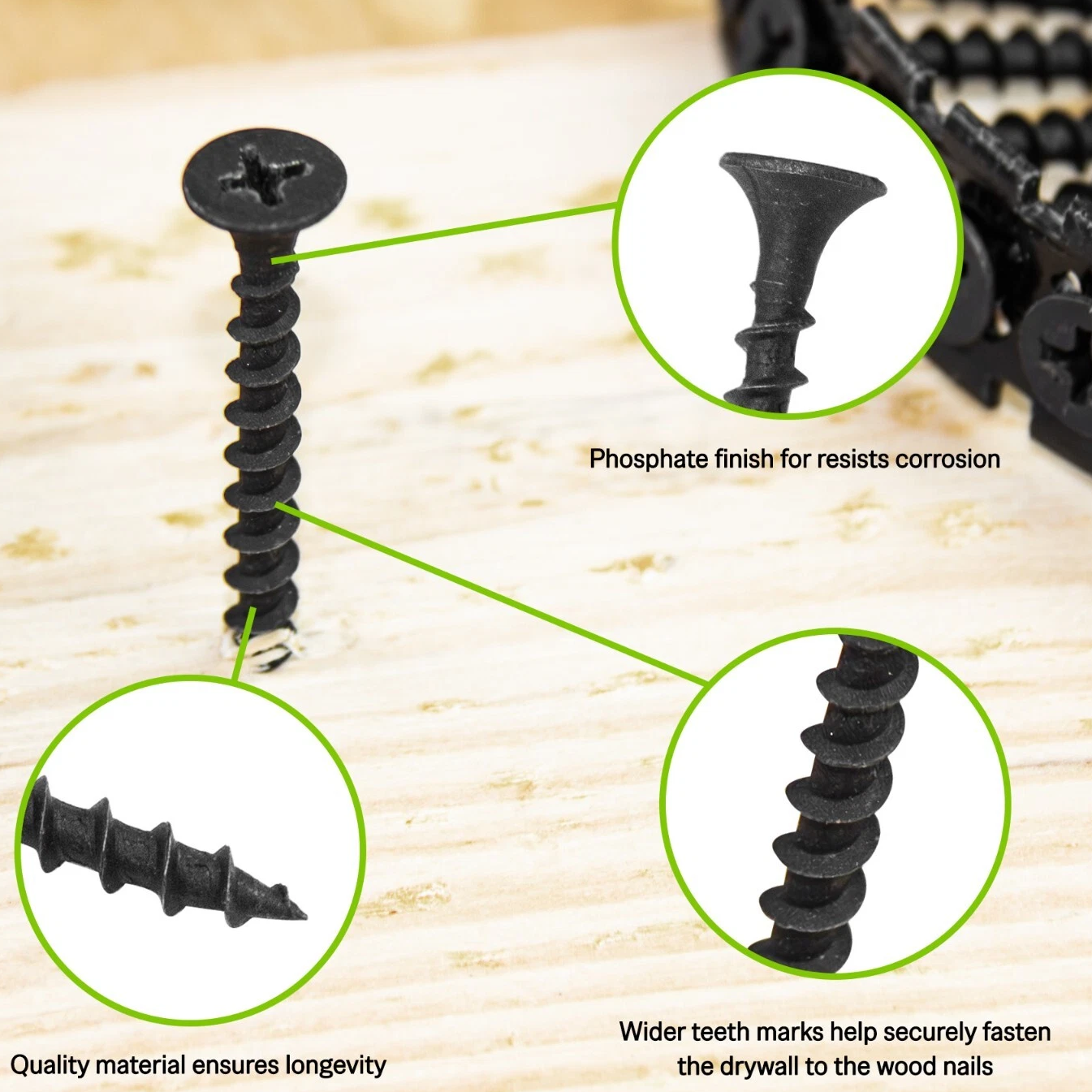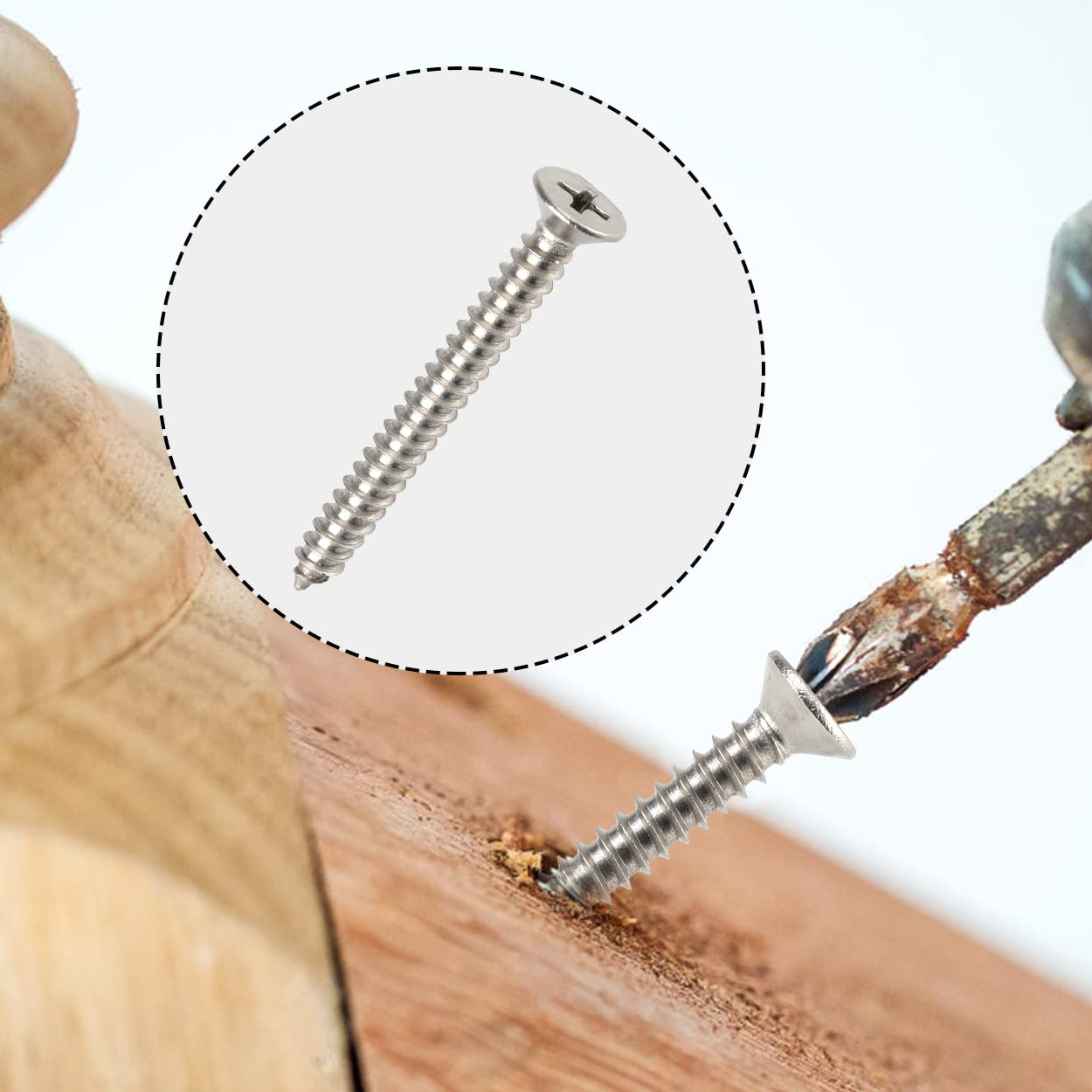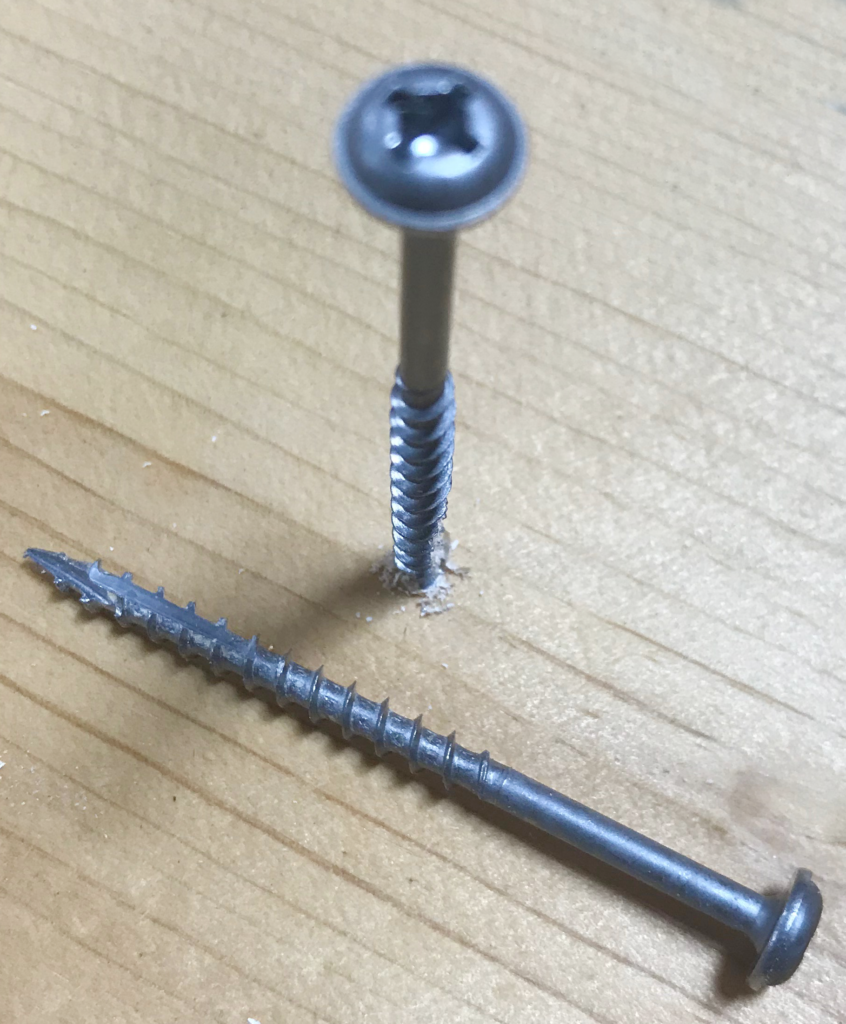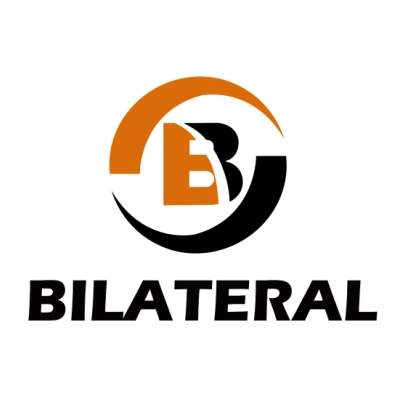Choosing the right screws can greatly improve the efficiency and quality of your woodworking projects. When you build furniture, flooring, or a deck, softwood and hardwood require different types of screws.
This guide explains the best wood screws for softwood and hardwood. It covers their features, uses, and tips for successful installations.
1.Types of Wood

Softwood
Examples: Pine, cedar, fir
Softwoods are easy to cut but can strip easily if the screw threads are too shallow.
Tip: Use coarse threads to ensure a firm hold.
Hardwood
Examples: Oak, maple, walnut
Hardwoods are dense and tough, increasing the risk of cracking or breaking screws if you don’t pre-drill.
Tip: Always pre-drill pilot holes for better results.
No matter if you’re working with softwood or hardwood, there’s always a screw that makes the job easier and cleaner. Choosing the right type of wood screw is key—it helps speed up your project, ensures a strong hold, and protects the wood from cracking or damage.
To help you make the best choice, we’ve tested and compared a wide range of wood fasteners. Here are our top picks for the best wood screws for hardwood and softwood screws. These screws offer great performance, durability, and are easy to use in real-life situations.
2.Best Screws for Softwood
Most types of softwood are relatively lightweight and easy to work with. However, their loose grain structure can also lead to problems—such as screws becoming loose or stripping out, especially when using shallow-thread screws.
That’s why choosing the right softwood screw is essential. It provides a strong, lasting hold and shows the professionalism of the designer or contractor in charge.
Coarse Thread Screws

- Ideal for: Pine, cedar, fir
- Features: Large thread spacing for strong grip
- Applications: Frames, shelving, basic furniture
- Benefits: No need for pre-drilling
- Tips: Avoid over-tightening to prevent wood fiber damage
Bugle Head Drywall Screws

- Ideal for: Light wood panels, studs
- Features: Bugle head spreads pressure evenly
- Applications: Drywall installation, light wood connections
- Benefits: Affordable and easy to find
- Caution: Not suitable for load-bearing joints
Self-Tapping Screws

- Ideal for: All softwoods
- Features: Sharp tip cuts its own threads
- Applications: Crates, DIY furniture
- Benefits: Fast installation, no pilot hole required
- Tips: Choose corrosion-resistant coating for outdoor use
Recommended Screws for Softwood
| Screw Type | Features | Best For | Tips & Notes |
|---|---|---|---|
| Coarse Thread Wood Screws | Deep threads, better grip in loose fibers | General softwood construction | Ideal for pine, cedar; no need for pre-drilling |
| Self-Tapping Screws | Cuts its own thread into wood | Fast installation in softwood | Use low-speed drill to prevent overdriving |
| Bugle Head Drywall Screws | Wide head, prevents pull-through | Softwood paneling or framing | Ensure the screw doesn’t split the wood with too much force |
| Deck Screws (for Softwood) | Corrosion-resistant, sharp point | Outdoor softwood like treated pine | Choose coated types for weather resistance |
3.Best Screws for Hardwood
Hardwoods are known for their high density and strong grain structure. While this makes them durable, it also brings challenges during installation. Without pre-drilling, driving screws directly into hardwood can easily lead to wood cracking—or worse, screw breakage.
To avoid these risks, selecting the right hardwood screw is critical. The correct screw type, paired with proper drilling techniques, ensures a secure hold and protects both the wood and the hardware from damage.
Fine Thread Wood Screws

- Ideal for: Oak, birch, maple
- Features: Tighter threads for dense grain
- Applications: Cabinets, flooring, premium furniture
- Benefits: Strong hold, less loosening
- Caution: Always pre-drill to prevent wood splitting
Torx Drive Screws (Star Head)

- Ideal for: All hardwoods, especially structural uses
- Features: Torx head reduces cam-out, better torque
- Applications: Staircases, door frames, high-stress joints
- Tips: Use matching Torx bit for best performance
Lubricated / Wax-Coated Screws

- Ideal for: Dense hardwoods like teak, hickory
- Features: Coating reduces friction during driving
- Applications: Flooring, heavy-duty joints
- Benefits: Reduces breakage risk
- Tips: Still pre-drill even with coated screws
Recommended Screws for Hardwood
| Screw Type | Features | Best For | Tips & Notes |
|---|---|---|---|
| Fine Thread Wood Screws | Tighter threads, stronger hold | Dense hardwoods like oak, maple | Pre-drilling is highly recommended |
| Trim Head Screws | Smaller head for cleaner finish | Furniture or cabinetry | Helps prevent surface cracking |
| Stainless Steel Screws | Strong, rust-resistant | High-end hardwood applications | Use with hardwood that may be exposed to moisture |
| Self-Drilling Screws | Built-in drill tip, no need to pre-drill | Fast and efficient hardwood fastening | Use only in hardwoods that tolerate self-drilling |
4.Screws Suitable for Both Softwood and Hardwood
In addition to screws specifically designed for softwood or hardwood, there are also multi-purpose wood screws that work well with both. These screws feature a universal thread design, allowing them to grip effectively in both soft and dense wood types.
Their design balances sharpness, thread depth, and durability. This makes them great for mixed-material projects or when you are unsure about the wood type. With the right screw, you can achieve strong holding power and reduce the risk of wood damage across a wide range of applications.
Pocket Hole Screws

- Ideal for: Soft and hardwood, depending on thread
- Features: Washer head, self-tapping tip
- Applications: Cabinets, drawer joints
- Tips: Use coarse thread for softwood, fine thread for hardwood
Deck Screws

- Ideal for: Outdoor projects in soft or hardwood
- Features: Corrosion-resistant coating, some self-drill
- Applications: Decks, fences, garden structures
- Benefits: Long-lasting, weather-resistant
- Tips: Use longer versions for hardwood stability
Confirmat Screws

- Ideal for: MDF, particleboard, engineered wood
- Features: Large diameter, straight thread
- Applications: Flat-pack furniture, cabinetry
- Benefits: Tight hold, accurate alignment
- Tips: Pre-drilling required, use matching drill bit
5.Comparison Table: Wood Screw Types by Use
| Screw Type | Wood Type | Thread Style | Pre-Drill Needed | Common Materials | Use Cases | Tips |
|---|---|---|---|---|---|---|
| Coarse Thread Screws | Softwood | Coarse | No | Zinc-plated, SS 304, Phosphate | Frames, shelves, studs | Choose length based on wood thickness |
| Drywall Screws | Softwood | Coarse | No | Phosphate steel, zinc-coated | Light panels, non-load bearing | Avoid in structural or hardwood use |
| Self-Tapping Screws | Softwood | Mixed | No | Zinc, SS, brass | DIY, fast projects | Adjust drill speed for softwood |
| Fine Thread Screws | Hardwood | Fine | Yes | Nickel, SS 304/316 | Furniture, flooring | Drill 70–85% of screw length |
| Torx Drive Screws | Hardwood | Fine/Mixed | Yes | SS 304/410, high-carbon steel | High-torque joints | Use with torque-limited tools |
| Wax-Coated Screws | Hardwood | Fine | Yes | Waxed carbon steel, SS 304 | Flooring, dense woods | Soap can substitute wax in emergencies |
| Pocket Hole Screws | Both | Depends | No | Zinc, SS, nickel-plated | Angled joints | Match thread to wood type |
| Deck Screws | Soft/Hard (Outdoor) | Coarse | Case-by-case | Ceramic, SS 410/316 | Outdoor decks, fencing | Use SS 316 near water |
| Confirmat Screws | Engineered Wood | Straight | Yes | Zinc-plated, nickel-plated | Flat-pack furniture | Use special drill bit for precision |
6.Wood Screw Installation Tips
- Always pre-drill in hardwood to prevent splitting.
- Use longer screws in softwood for better grip.
- Coarse threads = softwood; Fine threads = hardwood.
- Don’t over-tighten to avoid stripping.
- Use torque-controlled tools for safer installation.
7.Conclusion
Use coarse thread and self-tapping screws for softwood, and fine thread, Torx, or wax-coated screws for hardwood. Match screw type with wood hardness and structure needs to improve durability and efficiency.
8.FAQ
Q: Can drywall screws be used in hardwood?
A: Not recommended. They may snap during installation.
Q: What size pilot hole should I drill in hardwood?
A: About 85% of screw diameter. For a 4mm screw, drill a 3.4mm hole.
Q: Which is better: Torx or Phillips screws?
A: Torx screws offer better grip and prevent slipping—ideal for hardwood and power tools.
Q: Can wood screws be reused?
A: Some can, but avoid reusing in load-bearing joints.
Q: Are there universal screws for both wood types?
A: Yes. Deck screws and pocket hole screws are good options if you choose the right thread style.
About Us
Suzhou Bilateral Import & Export Co.,Ltd. is a manufacturer of high-quality solar photovoltaic brackets and fasteners integrating R&D, design, production and sales. Bilateral is a professional maker of photovoltaic brackets. We are dedicated to offering high-quality products and solutions. Our goal is to provide customers with individual photovoltaic brackets. We also offer complete design and service for a safe, reliable, and cost-effective photovoltaic bracket system. Suzhou Bilateral also makes many types of stainless steel fasteners. This includes self-tapping screws, self-drilling screws, bolts, and nuts.
Welcome to inquire
Contact:Sunny Han
Tel (WhatApp): +86-13451556833
Email:sales@szbilateral.com




